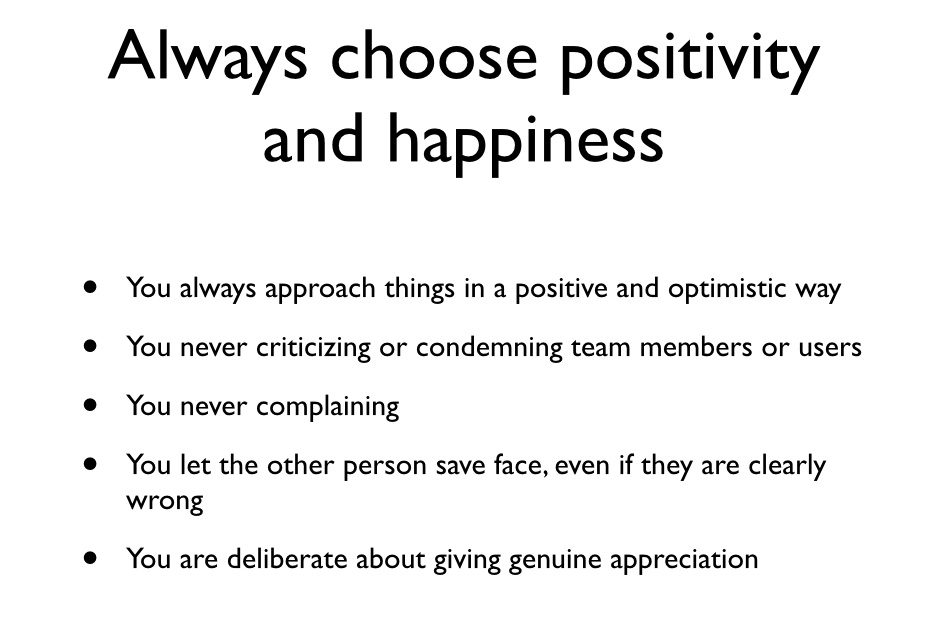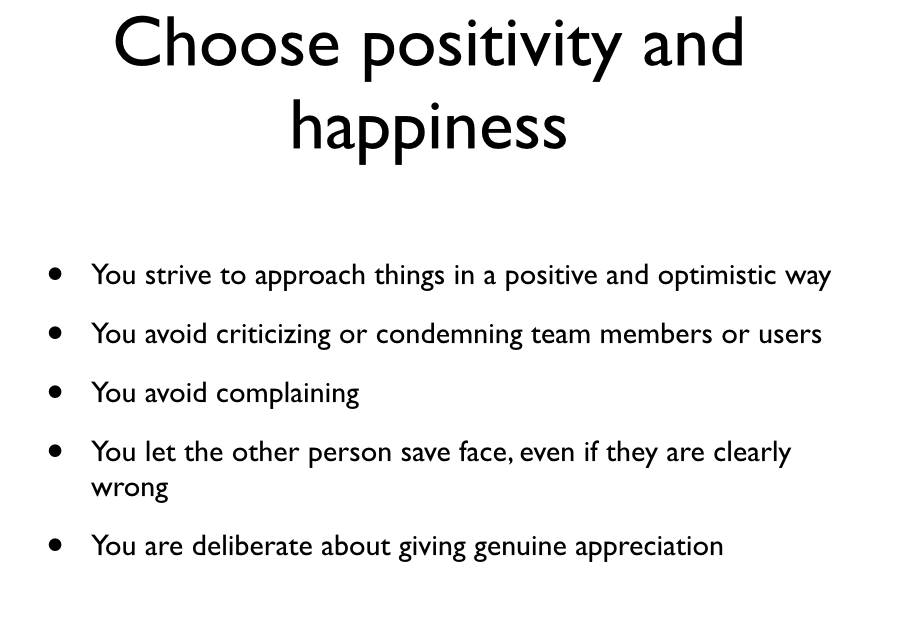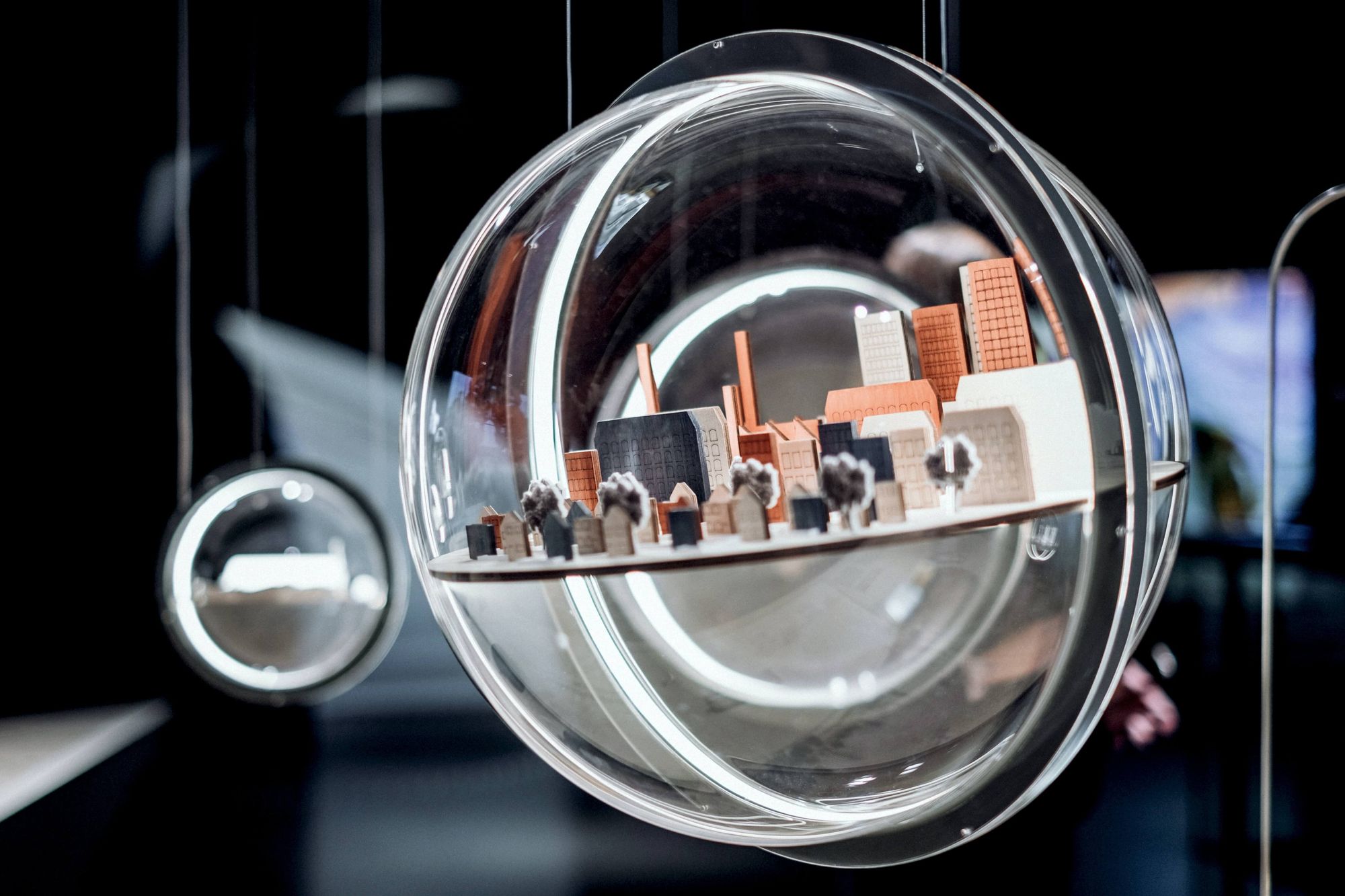We Changed Buffer’s Value of Happiness & Positivity by 1 Word: Here is Why
Just minutes ago, I went ahead and published a new version of Buffer’s culture-deck on Slideshare. It contains a tiny change that I and many on the Buffer team deemed a very important one.
Here is the slide that changed before:

and after:

The essential change, as you can see, is the removal of the word “always,” which many of us felt made things slightly dogmatic and too one-sided.
We’ve also changed the words “never” to something less one-sided, to be a better reflection of how we work as humans.
Inviting all of us into Buffer
There have been some very important things changing at Buffer through our change to being a manager-free company. It has meant people get to make their own decisions for what to work on. It has meant that a lot of our new core processes like hiring, setting a salary, giving and receiving feedforward and making decisions have changed completely.
It has also meant something else, namely that we allow all of us to be part of Buffer. With “all of us” in this context, I mean every element of who we are. Our joys, mistakes, downfalls and successes. Our dogs, kids, hobbies, good character traits and those that we still want to improve. As great as this may sound in writing, it’s a very challenging shift to do in a workplace where very distinct norms of what you can and can’t do have been established over the last 100 years or so throughout the industrial revolution.
Our phrasing of “always choose happiness” didn’t really go along well with this new idea of inviting all of us into Buffer. There are times when we aren’t happy and that’s OK. Banning our negative emotions can be quite dangerous, I believe, and taking care of them may be even more important than taking care of our positive ones.
A great quote that I’ve shared in a similar reflection before comes from Thich Nhat Hanh on this:
“We should never let the energy of anger go on swelling up all by itself, unattended; we need to call up our energy of mindfulness to come and take care of it. Mindfulness is like a mother who comes to embrace her suffering, crying baby. Our anger is just like a crying baby. When the mother picks up the distraught baby and tenderly holds him in her arms, the child starts to feel better already. When anger is embraced by mindfulness, it too begins to calm down.”
Comments from other team members on the change
Whenever we make a decision at Buffer, we use the advice process, where we propose a change and see what others think of it. In this case, there was a unanimously positive response from the team. I thought that it also reflected various nuances of this change that might be worthwhile to read:
Adam – I think the proposed adjustments mirror some of the sentiment from Courtney’s session while in Sydney on Happiness and Positivity. I think it also reflects a realistic representation of each of us an individuals. I appreciate the thought you put into this! I am all for the change if that is the decision ultimately made.
Carolyn – Feels much more like an aspirational value this way and less like we are always perfect at it.
Courtney – It feels like this is a very welcome shift into a more whole way of viewing the human experience. We will all experience the giant variety of human emotions out there (and we should!), and working on holding on to the positive moments and feelings of gratitude is such a worthwhile goal. Removing “always” and “never” seems like a great communication change to me overall–the world is seldom that simple and clear-cut. :)
Joel – I must admit, in our initial discussions about this, I had a slight gut feeling that I wouldn’t like to change anything. Although I completely agree with your points about how this value in its current form might be slightly stopping us bringing our full selves to work, I felt that so much good has come over the last 4 years for me personally by trying to be positive and never criticize.
Now that I read your suggestions, I feel like it strikes the perfect balance. I thought we might go quite far back the other way. However adjusting to ‘avoid’ feels perfect to me, and allows that room that we want to bring in.
I still struggle a lot with it. At the same time, I think I’ve become a much more positive person than pre-Buffer and I think me and others are better as a result of that. I think it helps me when approaching so many different situations. If we go down or get hacked, I can approach that positively. It also makes the whole team incredibly fun and inspiring to be around. I would love us to keep our discipline with this value. I also think that it’s possible to share our current struggles and give feedback and it still be positive and not criticize :)
I think what you’ve pinpointed (correct me if I’m wrong) is that sometimes ‘always positive’ can mean ‘not sharing your full feelings’ which both means lack of wholeness and also can potentially create artificial harmony (e.g. when there’s a new feature and someone doesn’t feel 100% happy with the current iteration, but doesn’t speak up since it could feel like negativity). In that regard, I fully welcome this slight change!
+1 from me :)
Daniel – It’s incredible how such a small difference in wording can make such a huge impact, Leo! Really think you nailed it on the head Carolyn in that this really makes this value feel more like something to aspire towards, than something we’re always able to do. Personally, similarly to Joel, I’ve found myself really becoming a much much more positive person since joining Buffer and it’s something I still work on each day. Having this be worded like this feels great, and very much (in my mind) in line with wholeness! Love it :-)
Octa – I love it, Leo! Echoing everyone here, it feels like this change in the wording it’s a slight one however it has such a powerful impact. It can be more buffery to have this as an aspiration, something to strive for. At the same time it leaves this door open to feel ok about embracing all the emotions and feelings that we can experience along the journey like you mentioned. Another +1 :)
Åsa – Feels like a great change, Leo! The wording feels more appropriate as we focus on aspirational goals and bringing our whole self to work. Like Joel and Daniel I have become a lot more positive since I joined Buffer and continue to work on ever single day. Love it :D
Colin – Agreeing with everyone else, this feels like a great change now that you have pointed it out Leo (and thanks for doing so!). I think it definitely feels slightly less dogmatic now, which resonates well with me. One thing – I felt like:
- You attempt to approach things in a positive and optimistic way
maybe sounded slightly ‘weak’? Don’t know what you would think about maybe a slight tweak to
- You strive to approach things in a positive and optimistic way
Philippe – Thanks for sharing your thoughts here! I love this change Leo! Even if my understanding of english is not always perfect I can already feel how this is different. First time I read the value back when I discovered Buffer, I remember it felt, as you say, dogmatic. With this change in the wording, even if sometimes it’s not natural at first (I assume this is what you mean when you say it is human nature to complain […]), it feels more like an invitation to self-improvement and an invitation to work on it :)
Besides, when I see you guys telling that since you’re at Buffer you’ve improved on being more positive and happy, it totally illustrates this value!
Hope this makes sense from a french side with not a perfect english :)
Dan – +1 Leo. The changes make it feel even more like a value and less like a rule.
Notorious BIG – “‘Cause I went from negative to positive and it’s all…. It’s alllll gooodd”
I think adding these comments shows how people see the importance of this change from various angles. It also illustrates our decision-making process well with input from team members. (All these comments are collected via Hackpad, which is our go to collaboration tool).
Our new culture-deck
Try Buffer for free
180,000+ creators, small businesses, and marketers use Buffer to grow their audiences every month.
Related Articles

We’ve always had teammates who have side projects in addition to working at Buffer. Working on new projects, building, experimenting, and self-improvement are built into our DNA as a company. So it's quite common to be speaking with someone only to find out they own a small business outside of Buffer that started as a side project. We also have several published authors and many apps built by Buffer teammates. We believe this entrepreneurial spirit and creative drive not only enhances our indiv

Every year since 2016 we've closed Buffer for a week at the end of the year. It’s like a reset, except across the whole company.

In this article, the Buffer Content team shares exactly how and where we use AI in our work.